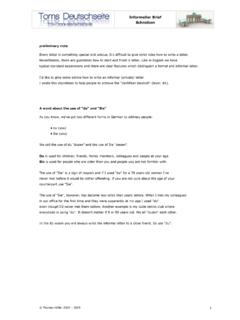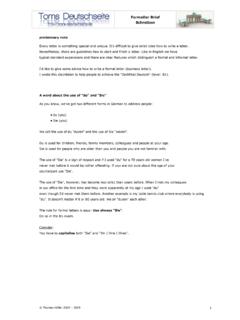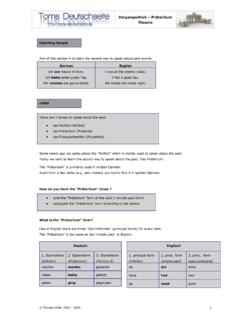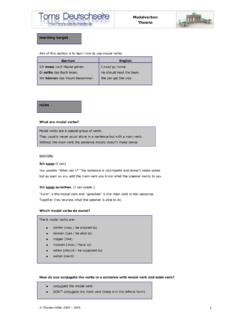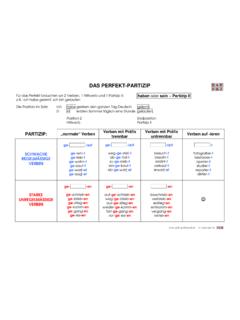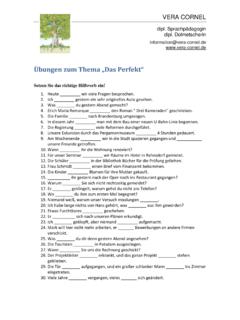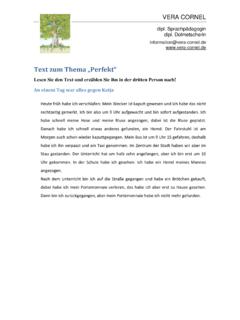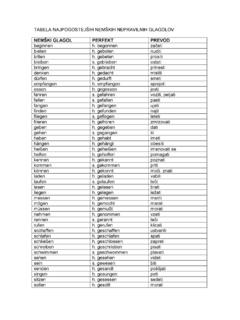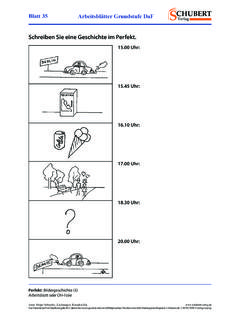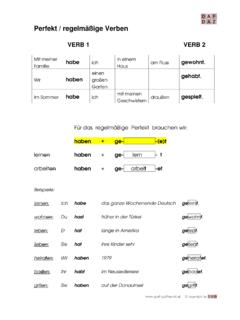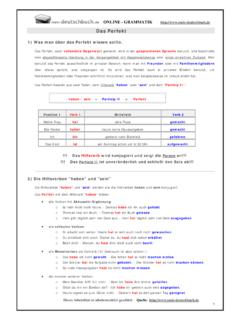Transcription of Vergangenheit – Perfekt Theorie learning target
1 Vergangenheit Perfekt Theorie Thomas H fler 2005 2009 1 learning target Aim of this section is to learn how to speak about past events. German English Ich habe heute viel gearbeitet. Ich bin bei meiner Freundin gewesen. Hast du sie gesehen? I worked a lot today. I have been at my girlfriend. Did you see her? rules There are 3 tenses to speak about the past: das Perfekt (Perfect) das Pr teritum (Preterite) das Plusquamperfekt (Pluperfect) We will concentrate at first on the " Perfekt " because it's almost always used and so the most important way to speak about the past.
2 Don't confuse the " Perfekt " in German with the "Present Perfect" in English. It doesn't have the same purpose. How do you form the " Perfekt " tense ? Hilfsverben (auxiliary verbs = "helping verbs") There are two "Hilfsverben" in German: haben (have) sein (be) When do you have to use "haben" and when "sein"? You use "sein" when the verb shows a change of position or condition gehen (go), kommen (come), wandern (hiking) You use "sein" when the verb shows a crossing of a "boundary" sterben (die), einschlafen (fall asleep) You use "sein" when the verb is an intransitive verb (=verb without direct object) Vergangenheit Perfekt Theorie Thomas H fler 2005 2009 2 For all other cases use "haben" as "Hilfsverb".
3 Another useful rule is that almost all weak verbs (see below) take "haben" as their "Hilfsverb". The only exception are the verbs "reisen" (travel) and "passieren" (happen). examples: Ich bin gestern gekommen. (I arrived yesterday.) Er ist gerade gegangen. (He has just gone.) Bist du schon eingeschlafen? (Did you fall asleep already?) The "Hilfsverb" is conjugated as usual. The main verb is transformed into the "Partizip II". What is the "Partizip II"? Like in English there are three "Stammformen" (principal forms) for every verb.
4 The "Partizip II" is the same as the "past participle" in English. Deutsch 1. Stammform (Infinitiv) 2. Stammform (Pr teritum) 3. Stammform (Partizip II) machen machte gemacht haben hatte gehabt gehen ging gegangen Englisch 1. principal form (infinitiv) 2. princ. form (simple past) 3. princ. form (past participle) do did done have had had go went gone How do you form the "Partizip II"? As you already heard from Mr Wolf there are three groups of verbs: weak verbs (regular) strong verbs (irregular) mixed verbs (irregular) weak verbs Weak verbs are easy to handle.
5 They are regular and follow a rule. To form the "Partizip II" of weaks verbs: take the stem (=verb without the ending "en") add "ge" in front of the stem add "t" after the stem Vergangenheit Perfekt Theorie Thomas H fler 2005 2009 3examples: machen (Infinitiv) -> gemacht (Partizip II) fragen (Infinitiv) -> gefragt (Partizip II) arbeiten (Infinitiv) -> gearbeitet (Partizip II) A few weeks ago we dealt with separable verbs. They consists of prefix+stem+en. Here you follow the same rule. Put the "ge" in front of the stem.
6 Examples: einkaufen (Infinitiv) -> eingekauft (Partizip II) vorstellen (Infinitiv) -> vorgestellt (Partizip II) zuh ren (Infinitiv) -> zugeh rt (Partizip II) Of course there are some little exceptions to this easy rule: exception 1: weak verbs which end with "ieren" don't get the prefix "ge" but only the suffix "t" examples: studieren (Infinitiv) -> studiert (Partizip II) fotografieren (Infinitiv) -> fotografiert (Partizip II) diskutieren (Infinitiv) -> diskutiert (Partizip II) exception 2: inseparable weak verbs don't get the prefix "ge" but only the suffix "t" examples: besuchen (Infinitiv) -> besucht (Partizip II) zerst ren (Infinitiv) -> zerst rt (Partizip II) erholen (Infinitiv) -> erholt (Partizip II) strong verbs The second group are the strong verbs.
7 They follow almost the same rules like the weak verbs but unfortunately, some of them change the stem vowel and some of them change the whole stem. To form the "Partizip II" of strong verbs: take the stem (=verb without the ending "en") add "ge" in front of the stem add "en" after the stem change the stem vowel or the whole stem for some strong verbs Vergangenheit Perfekt Theorie Thomas H fler 2005 2009 4examples: verbs with stem vowel change schreiben (Infinitiv) -> geschrieben (Partizip II) singen (Infinitiv) -> gesungen (Partizip II) fliegen (Infinitiv) -> geflogen (Partizip II) verbs with change of the whole stem sein (Infinitiv) -> gewesen (Partizip II) gehen (Infinitiv) -> gegangen (Partizip II) essen (Infinitiv) -> gegessen (Partizip II) Separable strong verbs behave similar to separable weak verbs.
8 They also get the "ge" between the separable prefix and the stem. take the stem (=verb without the ending "en") add "ge" in front of the stem add "en" after the stem change the stem vowel for some strong separable verbs examples: einschlafen (Infinitiv) -> eingeschlafen (Partizip II) mitnehmen (Infinitiv) -> mitgenommen (Partizip II) ausgehen (Infinitiv) -> ausgegangen (Partizip II) Inseparable strong verbs behave similar to inseparable weak verbs. They also don't get the "ge" in front of the stem.
9 Take the stem (=verb without the ending "en") DON'T put the "ge" in front of the stem add "en" after the stem change the stem vowel for some strong inseparable verbs examples: verstehen (Infinitiv) -> verstanden (Partizip II) erfinden (Infinitiv) -> erfunden (Partizip II) bekommen (Infinitiv) -> bekommen (Partizip II) mixed verbs The third group are the mixed verbs. They behave like strong and weak verbs. They've got the prefix "ge" and the suffix "t" like weak verbs but also change the stem vowel like strong verbs.
10 Fortunately, there are just 8 of them. Vergangenheit Perfekt Theorie Thomas H fler 2005 2009 5examples: denken (Infinitiv) -> gedacht (Partizip II) kennen (Infinitiv) -> gekannt (Partizip II) bringen (Infinitiv) -> gebracht (Partizip II) word order There is an easy rule where you have to put the "Hilfsverb" and the "Partizip II" in a statement. put the "Hilfsverb" after the subject put the "Partizip II" at the end of the sentence examples: Ich habe sie gesehen. (I saw her.) Ich bin in Cagayan gewesen.
